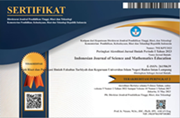Errors in solving quadratic equations and their impact on secondary school students' mathematics performance: A case study in Lebowakgomo sub-district
Abstract
Keywords
References
Charles, C.M. Building classroom discipline. Boston: Allyn & Bacon,2014
Department of education. Curriculum and Assessment Policy Statement (CAPS).
Mathematics-Foundation Phase. Pretoria: DBE,2011.
Department of education.. Curriculum and Assessment Policy Statement (CAPS). Mathematics: Foundation Phase: DBE,2012
Didis, M., bas, S. & Erbas, A. Students’ reasoning in quadratic equations with one unknown. In Proceedings of the 7th congress of the European society for research in mathematics education. Rzeszów, Poland,2011.
Didiş, M.G., & Erbaş, A.K. Performance and difficulties of students in formulating and solving quadratic equations with one unknown. Educational Sciences: Theory & Practice, 15(4):1137-1150,2015.
Dhlamini, Z.B. & Kibirige, I.. Grade 9 learner’s errors and misconceptions in addition of fractions. Mediterranean Journal of Social Sciences, 5(8), 236,2014
Luneta, K. & Makonye J.P.. Learners’ mathematical errors in introductory differentiation: A theoretical framework. US-China Education Review, 3(12):914-923,2013
Makgakga, S.. Learners’ performance and difficulties in solving quadratic equations by factorisation: a case study of six secondary schools in Limpopo province, South Africa. Association for Mathematics Education of South Africa, 1(1):301-315,2014
Makonye, J.P & Nhlanhla, S.. Exploring ‘Non-Science’ Grade 11 Learners’ Errors in Solving Quadratic Equations. Mediterranean Journal of Social Sciences, 5(2):627-634,2014
Available at:
http://www.mcser.org/journal/index.php/mjss/article/view/5124
Makonye, J.P. & Shingirayi, M. 2014. The Obstacle Faced by the Learners of Quadratic Inequalities. Mediterranean Journal of Social Sciences, [S.I], v. 5/ n. 27 p2, p.716, dec,. http: www.mcser.org/journal/index.php/mjss/article/view/5134 ,2014
Malahlela, M.V.. Using errors and misconceptions as a resource to teach functions to grade 11 learners (Doctoral dissertation), 2017
Mamba, F.T. x An investigation into students’ misconceptions in linear equations in public secondary schools of Malawi: The case of the South Eastern Education Division. Hiroshima, Japan: Hiroshima University, 2017
Mamba, A.. Learners’ errors when solving algebraic tasks: A case study of Grade 12 mathematics papers in South Africa (Unpublished MEd dissertation). 2012
University of Johannesburg, South Africa. Retrieved from: http://www.hdl.handle.net/10210/8552.
Mashazi, S.. Learners’ explanations of the errors they make in introductory algebra. Wits Maths Connect Secondary Project, school of education. University of Witwatersrand, South Africa, 2014
Mazhindu, L.,. Misconception’s learners encounter in solving quadratic equations: a case of 3 secondary schools in Zimbabwe (Doctoral dissertation, BUSE),2016
Mbusi, N.. Misconceptions related errors displayed by pre-service foundation phase teachers in transformation geometry. International Conference on Mathematics, Science and Technology Education, 386 – 400, 2016
Nielsen, L.E.J.. Understanding quadratic functions and solving quadratic equations: An analysis of student thinking and reasoning (Doctoral dissertation), 2015
Ritchie, J., spencer, L., Bryman, A. & burgess, R.G.Qualitative data analysis for applied policy research. Analysing qualitative data. 1994 Feb 4; 173:194, 1994
Saglam, R. & ala caci, C.. A comparative analysis of quadratics unit in Singaporean, Turkish and IMPD Mathematics text books. Turkish Journal of Computer and Mathematics Education, 3(3):131-147, 2012
Sarwadi, H.R.H. & Shahrill, M. Understanding students’ mathematical errors and misconceptions: The case of year 11 repeating students. Mathematics Education Trends and Research, 1-10,2014.
Steyn, G.. Teacher Collaboration and Invitational Leadership in a South African Primary School. Education and Urban Society. 48.
10.1177/0013124514536441,2014
Vygotsky, L. S. Mind in society: The development of higher psychological processes. Cambridge, MA: Harvard University Press, 1978.
Zakaria, E.I. & Maat, S.M. Analysis of Students’ Error in Learning of Quadratic Equations International Educational Studies, 3(3):105-110 ,2010.
DOI: http://dx.doi.org/10.24042/ijsme.v8i1.21189
Refbacks
- There are currently no refbacks.
Copyright (c) 2025 Unit Riset dan Publikasi Ilmiah FTK UIN Raden Intan Lampung

This work is licensed under a Creative Commons Attribution-ShareAlike 4.0 International License.

Indonesian Journal of Science and Mathematics Education is licensed under a Creative Commons Attribution-ShareAlike 4.0 International License.





